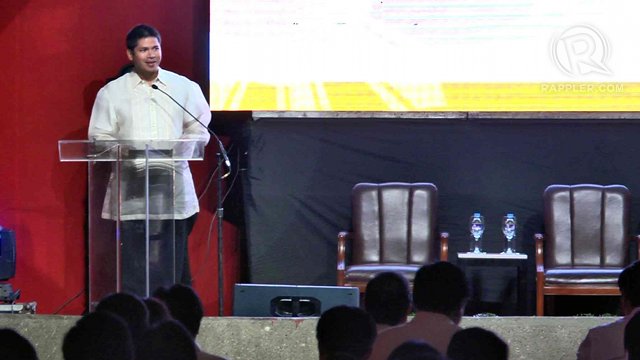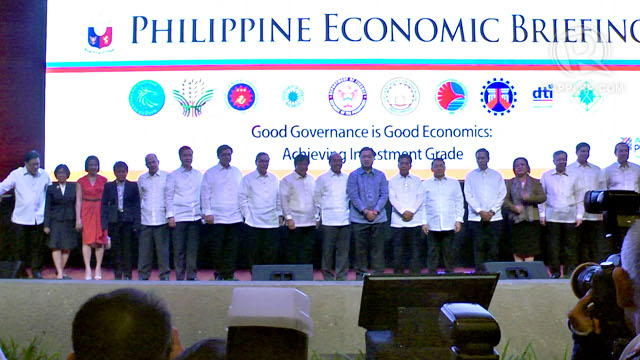SUMMARY
This is AI generated summarization, which may have errors. For context, always refer to the full article.

MANILA, Philippines – How should the Philippines sustain its healthy economic growth?
Venture capitalist Francisco “Paco” Sandejas offered his insights as a representative of the private sector during the Philippine Yearend Economic Briefing on February 13.
“The accomplishments are just the beginning. There’s still much work to be done,” noted Sandejas, managing partner of Manila-based Narra Venture Capital, as he acknowledged the various economic and fiscal improvements under the Aquino administration.
“What are the things we can really do to make big changes?” he asked at the briefing attended by the country’s top economic managers.
Answering them, he shared 4 key points that well-managed corporations already do and which he urged the government officials to practice too:
1. Just do it
This advice takes off from the delays in the government’s flagship infrastructure development program relaunched under the Public-Private Partnership (PPP) scheme way back in 2010.
“We need to work faster or we could lose the backing of many good PPP (public-private partnership) proponents…If we lose momentum, investors will move on since they need to place money somewhere….The patience in the business world only runs so far,” he stressed.
“We have to behave like a private company, set goals and beat our competitors who are coming from other countries,” he added.
The PPP projects were meant to tap private sector expertise and financing to address the Philippines’ underdeveloped infrastructure. Only two of the 50 identified projects have been awarded since 2010, about 7 are in various stages of roll-out, while the rest are still under study.
“You are actually doing a good job of talking less and doing more. But we need to work faster,” he said as the heads of the transportation, public works, agriculture, health and socio-economic planning departments — all involved in the PPP scheme — sat among the audience.
The delays in implementing plans cascade in various sectors of the economy, he noted. He said he invested in companies in China that work 2 to 3 times faster. In 6 months, he noted they can finish a job that Philippine companies haven’t even hired for yet.
2. Move up the value chain
Sandejas, who spent over two decades in the Silicon Valley technology hub in California, highlighted the need to deepen the country’s science and technology sector and information technology (IT) infrastructure so the country can move up the value chain.
He cited the case of the business process outsourcing (BPO) industry, a major dollar earner of the country where the low-end, low-margin voice-based services have catapulted the Philippines as the world’s call center capital, edging out India.
He warned that the industry may risk falling by the wayside like the once-promising electronics industry, still the country’s main export product.
“It’s gonna go the way, unfortunately, of electronics…In electronics we were top of the world in manufacturing [before other low-cost countries overtook us]. And if we don’t move the value chain up, [the] same [will happen] with BPOs…We’re cost competitive for service but we want to be a modern Philippines where we don’t always need to import from China or Taiwan our computers or solar panels.”
3. Leverage technology
“Use technology to increase competitiveness,” he stressed.
He called for “broadband Internet in every government office,” the development of ICT in government to have “valuable data analysis,” and a focus on IT-related education programs.
“We need you to focus on science and technology because it’s also a national tool, whether we have a department, I don’t care. What we really is a person in charge,” he said, making reference to the dissolved Commission on Information and Communications Technology (CICT), the agency tasked to develop the country’s ICT policies.
“At the Philippine Development Foundation, we are emphasizing the need to deepen knowledge of engineering and science.”
Sandejas, who has a Ph.D. in Electrical Engineering from Stanford University, added that the Philippines has become such an attractive destination for IT ventures that Filipinos abroad are looking to head back to the country to take advantage of opportunities in the industry.
“Many people are willing to invest. But [on] the product definition, we are lacking in some of those aspects. “There’s an influx of returning Filipinos helping to run these companies.” he said.
He said this highlights a gap between the funds flowing into the IT space and the available human resources. “These companies can be here in the Philippines but we need more people, we need those product managers and we need the scientists.”
4. Get the right people
One of the highlights of Sandejas’ presence at the briefing panel was his focus on “getting the right people” to manage government projects–a goal that involve firing underperformers, even if they are friends.
The venture capitalist said “getting the right people to lead and manage projects” is key to success.
Without citing an example, he noted that the government sometimes favors friends over more qualified individuals. “Sometimes, we need to make changes and we need to learn to fire our friends.”
“One thing I’ve learned working in the Valley is, if things are not moving fast, normally the problem is at the top. And oftentimes we fire the chief executive officer,” Sandejas said.
He acknowledged obstacles in practicing the same in the Philippines. “There are so many obstacles. Many come from private sector and we know its hard. Everyone here is our friend.”
“But even if it’s politically hard and due to friendship…we need to get used to firing people and we need to get to the root cause…But we need to learn to do it well with dignity and fairness.”
To spare the government, he made a call: “If you’re not good, don’t apply for the job. Please.
He also called for an increase in the pay of qualified government officials. He said he favors a pay model similar to Singapore where government officials and employees are paid similar to their private-sector counterparts as an incentive to perform. – with reports from Christian Bautista/Rappler.com

Add a comment
How does this make you feel?
There are no comments yet. Add your comment to start the conversation.